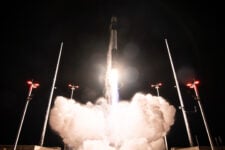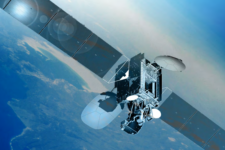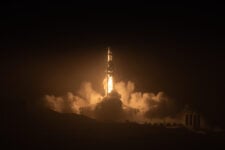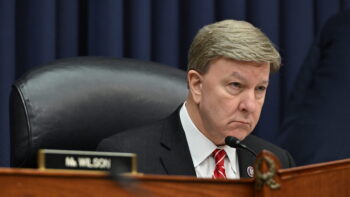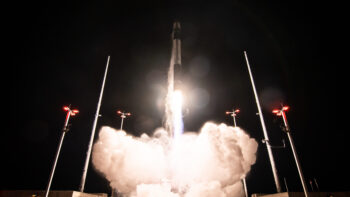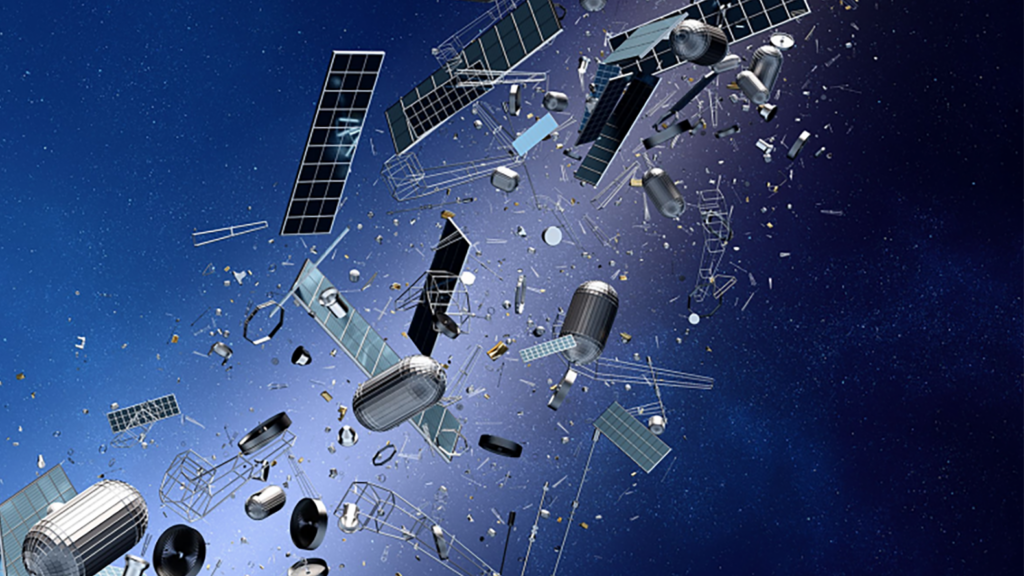
Kinetic ASATs could create enormous amounts of dangerous space debris that could harm commercial satellites. (Image: National Space and Intelligence Center)
WASHINGTON — The UN General Assembly has overwhelmingly approved the US-proposed resolution calling on states to commit to a moratorium on testing of destructive anti-satellite missiles, with 155 countries voting yes, nine voting no, and nine nations abstaining.
Unsurprisingly, Russia, China, and Iran were among the naysayers. India, another major space player, abstained. Interestingly, North Korea did not register a vote during the Dec. 7 meeting in New York — which one US diplomat said was unusual as Pyongyang normally goes out of its way to vote “no” on all US-sponsored resolutions.
The State Department put the resolution on the table at the United Nations in September, as first reported by Breaking Defense. The move followed the White House’s unilateral pledge in April to refrain from testing kinetic energy, ground-launched ASAT missiles.
The UN vote to support the resolution does not commit individual nations to the moratorium, but signals that there is widespread support for the concept. Thus, it was good news for Washington, where government officials are currently engaged in a campaign to convince other nations to formally pledge to implement the moratorium.
Canada, New Zealand, Germany, Japan, the United Kingdom, South Korea, Switzerland, Australia and, France have now made such pledges.
France just last month became the ninth nation to do so, a day prior to Vice President Kamala Harris’s Nov. 30 meeting with French President Emmanuel Macron at NASA headquarters, building on a meeting from roughly a year ago where the two pledged their countries to building up space cooperation across the commercial, civil and national security realms. According to a White House readout of the Harris-Macron meeting, the two “agreed to strengthen U.S.-France space cooperation across civil, commercial, and national security sectors.”
The meeting between Harris and Macron followed the first Comprehensive Dialogue on Space, held in Paris Nov. 17, which involved US officials the National Space Council, National Security Council, the Defense Department, NASA, and the State Department among others. During that meeting, both sides vowed to work together on space-related issues from climate change to national security, including on the development of norms for on-orbit activities.
US diplomats are hopeful that the positive UN vote will spur more nations to individually sign up to the moratorium. In particular, Washington is working to convince more European countries and India to so, multiple government sources told Breaking Defense
France and Germany are Europe’s two biggest European space players, but Italy is also a major space operator of both civil and military satellites, and so far Rome has remained uncommitted. Luxembourg also is emerging as a European space hub and has yet to sign up.
India is a key space operator in the Indo-Pacific region, and the US long has tried to cultivate New Delhi as a partner on international security space issues — especially as China continues to modernize and expand its activities in outer space across sectors.
Meanwhile, a group of Senate and House democrats, led by Californians Sen. Diane Feinstein and Rep. Ted Lieu, have cosponsored a resolution to support the Biden administration’s ASAT test moratorium that also urges more countries to follow suit.
“The Department of Defense currently tracks more than 47,000 objects in space larger than 10 cm, including debris from anti-satellite missile tests, which can harm vital assets in orbit. The amount of debris has increased by nearly 50 percent since January 2021 and is expected to continue rising as governments launch more satellites and conduct harmful anti-satellite missile tests,” explains the joint Feinstein-Lieu press release.
“Destructive anti-satellite missile tests create large amounts of space debris that threaten astronauts and satellites that provide vital services,” said Feinstein.
Lieu, who co-chairs the California Aerospace Caucus and whose district includes Space Systems Command, noted that as the US expands “commercial, scientific and defense efforts in space,” the government needs to “ensure we’re being responsible stewards of the ‘final frontier’.”
While Lieu was the only co-sponsor from the House, seven other Senators joint on: John Hickenlooper, D-Colo., Chris Van Hollen, D-Md., Angus King, I-Maine, Mark Kelly, D-Ariz., Alex Padilla, D-Calif., Edward J. Markey, D-Mass., and Patty Murray, D-Wash.
HASC chair backs Air Force plan on space Guard units (Exclusive)
House Armed Services Chairman Mike Rogers tells Breaking Defense that Guard advocates should not “waste their time” lobbying against the move.





